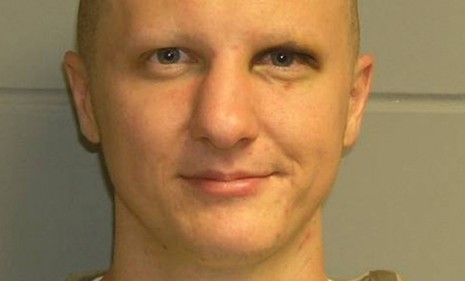Jared Loughner 'mentally unfit' for trial: What happens now?
The accused Tucson gunman appeared "disturbed" and "delusional" in court Wednesday, raising questions about the prosecution's ability to seek justice

A federal judge ruled Wednesday that Jared Loughner is mentally unfit to stand trial for the Jan. 8 Tucson shooting, which killed six people and left Rep. Gabrielle Giffords (D-Ariz.) severely wounded with a bullet to the brain. Mental health experts say Loughner suffers from schizophrenia. So where does the effort to prosecute him go from here? Below, a brief guide to the next steps:
Why can't Loughner face trial right away?
Two experts who examined Loughner recommended that Judge Larry A. Burns find him mentally incompetent for a trial. A federal prison psychologist appointed by the prosecution conducted 12 interviews with Loughner over nine hours, concluding that Loughner's thoughts were random and disorganized, and that he suffered delusions. A psychiatrist appointed by the judge talked to Loughner five times over seven hours, finding that he appeared to suffer from paranoid schizophrenia. Judge Burns decided that Loughner's "major mental illness" left him so delusional and psychotic that the case could not proceed.
The Week
Escape your echo chamber. Get the facts behind the news, plus analysis from multiple perspectives.

Sign up for The Week's Free Newsletters
From our morning news briefing to a weekly Good News Newsletter, get the best of The Week delivered directly to your inbox.
From our morning news briefing to a weekly Good News Newsletter, get the best of The Week delivered directly to your inbox.
How did Loughner behave in court Wednesday?
At first, he slouched and rocked in his seat. Then, midway through the proceedings, he interrupted the judge with an "angry outburst," screaming either "Thank you for the free shot" or "Thank you for the freak show" (witnesses gave conflicting accounts) and, "She died in front of me." He also called the judge "treasonous." Loughner was dragged away in handcuffs, still yelling. Eric Fuller, who was shot in the knee and back during the Tucson rampage, said Loughner's mental problems are impossible to ignore. "You don't have to be a psychiatrist to know that the boy is disturbed," says Fuller, as quoted by the Associated Press.
Where will Loughner go now?
Since the 22-year-old college dropout has been deemed unfit for trial, he will be sent to a federal facility in Missouri for four months of psychiatric treatment designed to get him to the point where he fully understands the case against him. If experts believe medication will allow him to understand the legal proceedings, his doctors could be allowed to force him to be medicated. If his delusions can't be treated successfully, he will remain in a psychiatric facility.
A free daily email with the biggest news stories of the day – and the best features from TheWeek.com
What if he's faking?
He isn't, the experts say. If someone is "malingering," or faking mental illness, he or she usually wants to be described as mentally ill. Loughner doesn't — in fact, Burns said, "He scoffs at it." Another sign that his mental problems are legitimate is that his behavior didn't suddenly change. It has been getting progressively worse for several years.
Is it possible he won't ever face trial?
Yes. If he's never deemed mentally fit for trial, he could remain in a psychiatric facility indefinitely. But prosecutors say they will continue pressing, hoping for the day when they can proceed with their case. "Our goal has always been and always will be to go to trial," says U.S. attorney Dennis K. Burke, as quoted in The New York Times.
Will the judge reconsider?
Yes, a hearing to revisit Loughner's psychiatric health has been set for Sept. 21. But debate over a defendant's mental competency can drag on for a long time — nearly nine years in the Elizabeth Smart kidnapping case, for instance. And, legally, there is no limit to the number of times a court can grant extensions.
Sources: LA Times, AP, NY Times, Arizona Daily Star
-
 The best family board games
The best family board gamesThe Week Recommends Put down the smartphones and settle in for some old fashioned fun
-
 Dive right into these 8 underwater adventures
Dive right into these 8 underwater adventuresThe Week Recommends It’s time to make a splash
-
 The world’s oldest rock art reveals hints about human migration
The world’s oldest rock art reveals hints about human migrationUnder the Radar The art is believed to be over 67,000 years old
-
 The billionaires’ wealth tax: a catastrophe for California?
The billionaires’ wealth tax: a catastrophe for California?Talking Point Peter Thiel and Larry Page preparing to change state residency
-
 Bari Weiss’ ‘60 Minutes’ scandal is about more than one report
Bari Weiss’ ‘60 Minutes’ scandal is about more than one reportIN THE SPOTLIGHT By blocking an approved segment on a controversial prison holding US deportees in El Salvador, the editor-in-chief of CBS News has become the main story
-
 Has Zohran Mamdani shown the Democrats how to win again?
Has Zohran Mamdani shown the Democrats how to win again?Today’s Big Question New York City mayoral election touted as victory for left-wing populists but moderate centrist wins elsewhere present more complex path for Democratic Party
-
 Millions turn out for anti-Trump ‘No Kings’ rallies
Millions turn out for anti-Trump ‘No Kings’ ralliesSpeed Read An estimated 7 million people participated, 2 million more than at the first ‘No Kings’ protest in June
-
 Ghislaine Maxwell: angling for a Trump pardon
Ghislaine Maxwell: angling for a Trump pardonTalking Point Convicted sex trafficker's testimony could shed new light on president's links to Jeffrey Epstein
-
 The last words and final moments of 40 presidents
The last words and final moments of 40 presidentsThe Explainer Some are eloquent quotes worthy of the holders of the highest office in the nation, and others... aren't
-
 The JFK files: the truth at last?
The JFK files: the truth at last?In The Spotlight More than 64,000 previously classified documents relating the 1963 assassination of John F. Kennedy have been released by the Trump administration
-
 'Seriously, not literally': how should the world take Donald Trump?
'Seriously, not literally': how should the world take Donald Trump?Today's big question White House rhetoric and reality look likely to become increasingly blurred